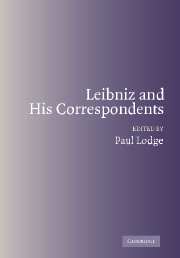Book contents
- Frontmatter
- Contents
- Contributors
- Abbreviations
- Acknowledgments
- 1 Introduction
- 2 Leibniz and His Master: The Correspondence with Jakob Thomasius
- 3 A Philosophical Apprenticeship: Leibniz's Correspondence with the Secretary of the Royal Society, Henry Oldenburg
- 4 The Leibniz–Foucher Alliance and Its Philosophical Bases
- 5 Leibniz to Arnauld: Platonic and Aristotelian Themes on Matter and Corporeal Substance
- 6 Leibniz and Fardella: Body, Substance, and Idealism
- 7 Leibniz's Exchange with the Jesuits in China
- 8 Leibniz's Close Encounter with Cartesianism in the Correspondence with De Volder
- 9 “All the time and everywhere everything's the same as here”: The Principle of Uniformity in the Correspondence Between Leibniz and Lady Masham
- 10 Idealism Declined: Leibniz and Christian Wolff
- 11 On Substance and Relations in Leibniz's Correspondence with Des Bosses
- 12 “[…] et je serai tousjours la même pour vous”: Personal, Political, and Philosophical Dimensions of the Leibniz–Caroline Correspondence
- References
- Index
11 - On Substance and Relations in Leibniz's Correspondence with Des Bosses
Published online by Cambridge University Press: 02 September 2009
- Frontmatter
- Contents
- Contributors
- Abbreviations
- Acknowledgments
- 1 Introduction
- 2 Leibniz and His Master: The Correspondence with Jakob Thomasius
- 3 A Philosophical Apprenticeship: Leibniz's Correspondence with the Secretary of the Royal Society, Henry Oldenburg
- 4 The Leibniz–Foucher Alliance and Its Philosophical Bases
- 5 Leibniz to Arnauld: Platonic and Aristotelian Themes on Matter and Corporeal Substance
- 6 Leibniz and Fardella: Body, Substance, and Idealism
- 7 Leibniz's Exchange with the Jesuits in China
- 8 Leibniz's Close Encounter with Cartesianism in the Correspondence with De Volder
- 9 “All the time and everywhere everything's the same as here”: The Principle of Uniformity in the Correspondence Between Leibniz and Lady Masham
- 10 Idealism Declined: Leibniz and Christian Wolff
- 11 On Substance and Relations in Leibniz's Correspondence with Des Bosses
- 12 “[…] et je serai tousjours la même pour vous”: Personal, Political, and Philosophical Dimensions of the Leibniz–Caroline Correspondence
- References
- Index
Summary
Leibniz's correspondence with the Jesuit theologian and philosopher Bartholomew Des Bosses is one of the richest sources of Leibniz's mature philosophical thought. Occupying the last ten years of Leibniz's life (1706–16), the period of composition of the Theodicy (1710), the Monadology (1714), and the Principles of Nature and Grace (1714), and comprising close to 140 letters, this correspondence shows Leibniz confronting some of the most difficult questions concerning his metaphysics: the nature of composite substance and the reality of relations. Moreover, because the correspondence was never meant to be published, it offers us a unique and salutary perspective on Leibniz's philosophy, for it is here that Leibniz is at his most relaxed, working out ideas in his system.
For many scholars, however, the Leibniz–Des Bosses correspondence is inextricably linked with that “enigma” (Blondel 1930) of modern philosophy, the vinculum substantiale, or substantial bond of monads – that which is apparently invoked by Leibniz to explain transubstantiation within his monadological metaphysics. It should not be surprising, then, that Bertrand Russell's well-known, damning remark about the vinculum substantiale – that it was “rather the concession of a diplomatist than the creed of a philosopher” (1937: 152) – has cast a pall over much of the scholarship relating to the Leibniz–Des Bosses correspondence. Russell's view, pushed to its extreme, seemed to be that the entire correspondence constitutes simply an attempt on Leibniz's behalf to placate his benighted, Catholic friend, and, as such, that we hardly need to concern ourselves with any of Leibniz's arguments with Des Bosses.
- Type
- Chapter
- Information
- Leibniz and his Correspondents , pp. 238 - 261Publisher: Cambridge University PressPrint publication year: 2004
- 1
- Cited by



